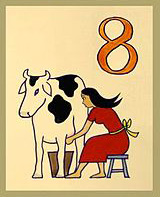Le huitième jour de Noël, mon amour m’a donné : huit femmes en train de traire…
(On the eighth day of Christmas, my true love gave to me: eight maids a-milking…)
This is all without autotune, Mr Cowell, just imagine the potential…
This line was very hard to translate. Before I go into detail:
1. No elision for numerals – Notice it’s “Le huitième“. For some weird reason numerals don’t obey the usual elision rule that replaces le or la with l’ before a vowel or h.
2. un fermier / une fermière (a farmer or farm hand), but the word fermière has a lot of syllables and we need to cut some. We’ve opted for femmes (women, pronounced “fam“) since the fact they are milking already gives the sense of being maids and this only has one syllable.
3. traire – “to milk”, which is in fact a short form of extraire (to extract)
Okay, now the difficulties. “Huit fermières” just means eight lady farmers and has no sense of “milking”, so that won’t do. I couldn’t use my previous trick here because “trayeuses” (milkers/extractors) has come to mean the machines that do milking, if it ever meant maids in the first place. So, the real lesson from this line is how you best express ongoing actions in French since we’ve already established the absolute pantsness of the present participle in French for this purpose:
4. “en train de“ (“in the middle of”). In English we have two present tenses: one that expresses continuous or ongoing actions such as “I’m singing”, and another which has a timelessness about it: “I sing”. The Present continuous (or progressive) uses present participles (-ing words, like singing). In French, there is no present continuous tense. Le Présent is used to express both of these cases: je chante. If you really need to emphasise ongoing action, you can use the expression “être en train de” (to be in the middle of), like this: je suis en train de chanter. You have to choose which is the correct translation according to how much you need to emphasise that you are “in the middle of” singing.
5. Then again, if you were wanting to say, “I’m in the bath, singing”, this is one of those rare cases where you would use chantant: Je suis dans le bain, chantant. You can use the present participle to describe something you’re doing whilst doing something else. (You could use “en train de chanter” here too.)
You could even combine these, so if your maids were singing whilst milking, it would be okay say “Huit fermières chantant en train de traire”. You just can’t use chantant unless something else is going on.
This line is quite a mouthful though, so by all means use huit trayeuses if your true love happens to be a slightly less romantic engineer with an obsession for farm machinery; or you might find it easier to sing huit vaches laitières, which are cows bred for milk, if you’d rather receive cows than maids. I’m fairly sure it’s illegal to own maids anyway, these days, so maybe that’s your best bet.
More: 7th Day | The 12 Days of Christmas | 9th Day
